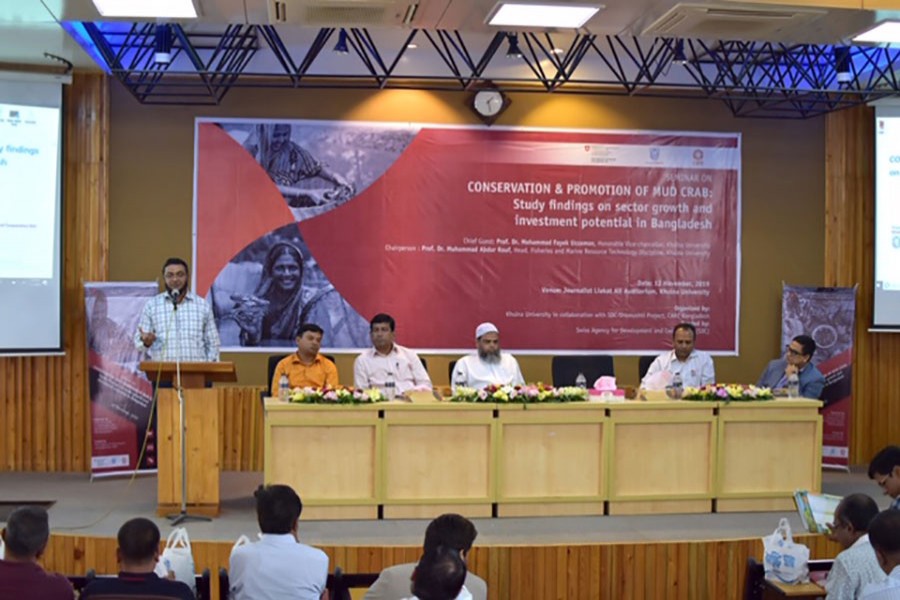Call to revise safety net provision for crab farmers
Extension of ban period also suggested

Published :
Updated :

There is a crying need to revise the safety net provision for crab farmers and the existing ban period to collect wild crabs should be stretched.
Speakers came up with the recommendations while unveiling report of a recent study on crab farming in Khulna, jointly organised by CARE Bangladesh and Khulna University on Wednesday.
Other recommendations, including social safety net support for crab farmers during the ban period, were made in the programme attended by Prabodh Devkota, Acting Country Director of CARE Bangladesh, as special guest.
The research was funded by the SDC-Shomosthi project implemented by CARE Bangladesh. Under this project, CARE is supporting 180,000 rural households following M4P approach more commonly known as Market Systems Development. SDC-Shomosthi project seeks to change the way that markets work, so that poor people are included in the benefits of growth and economic development.
Dr Muhammad Yusuf Ali and Dr Md. Golam Sarower from Fisheries and marine resource technology (FMRT) discipline of Khulna University shared key findings on the research on mud crab (Scylla olivacea). Mud crab recently emerged as a potential export commodity. Its farming is increasing rapidly in the southern Bangladesh because of its lucrative price and high demand in the international market. However, the farming or fattening of mud crab is entirely dependent on capturing wild crablets. A huge quantity of mud crab is being caught indiscriminately from the adjacent Sundarbans areas and thus putting intense pressure on its wild stock, which is a major concern from conservation point of view, according to a press release.
Research revealed that the peak breeding season for the mud crab is March-April. At present, there is a ban on the collection of crablet from January to February, which needs to be adjusted in line with the findings of the research. Findings also demonstrated that the hatchery-produced crablets are as good as the wild crablets. In some cases, hatchery-produced crablets demonstrated better result than the wild ones. During banning periods, subsides are recommended for the people solely dependent on crab collecting.
"Study findings from Khulna University shed new lights on potential national and international market for crab farming. This will help crab farmers especially women to come out of poverty”- said Prabodh Devkota, Acting Country Director of CARE Bangladesh. He also added that such research will help government, policy makers and private sectors to come together and explore the potential for hatchery-produced crablets.
Thanking CARE Bangladesh for supporting the research initiative, Dr Mohammad Fayek Uzzaman, Vice Chancellor of Khulna University added, “Opportunities to promote hatchery-produced crablets must be explored in light of the research to reduce burden on the wild crablets”.
Sohel Ibn Ali, Senior Program Manager of SDC, Prabodh Devkota, Acting Country Director of CARE Bangladesh, Md. Aamanur Rahman, Director of ERPP, Md Gias Uddin Talukder, Senior Team Leader of SDC-Shomoshti Project discussed about prospect and possibilities regarding crab sector and the promotion of hatchery-produced crablets. The seminar was chaired by Dr Muhammad Abdur Rouf, Head, FMRT Discipline under Khulna University.


 For all latest news, follow The Financial Express Google News channel.
For all latest news, follow The Financial Express Google News channel.